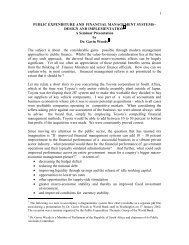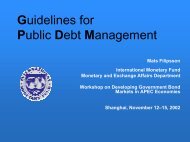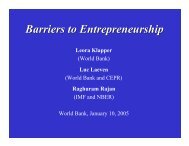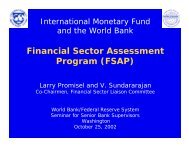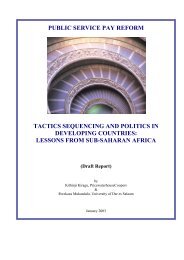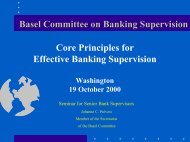CORRUPTION ASSESSMENT: MOZAMBIQUE - World Bank
CORRUPTION ASSESSMENT: MOZAMBIQUE - World Bank
CORRUPTION ASSESSMENT: MOZAMBIQUE - World Bank
You also want an ePaper? Increase the reach of your titles
YUMPU automatically turns print PDFs into web optimized ePapers that Google loves.
1. IntroductionMozambique has made great strides, particularly since the signing of its peace agreementin 1992 and its first multi-party elections in 1994. The country is in many ways adevelopment success story, and the government and its donor partners have stimulatedimpressive economic growth—albeit from a very low starting point—that seems to havehad a positive impact on reducing overall poverty in this poorest of countries. However,Mozambique’s development story is clouded by widespread and persistent corruption.This corruption is both a symptom of deeper structural imbalances within Mozambique’stenuous democracy and a threat that has the potential to undermine Mozambique’s futureprogress. Profound, long-term efforts to reform the political system and addresscorruption are needed to ensure the country’s stability, economic growth, anddemocratization. It is not yet clear that Mozambique’s leaders are willing to make thesechanges.Corruption has been spreading rapidly over the past 20 years and now reaches intovirtually every sector, function, and level of government. The scale and scope ofcorruption in Mozambique has reached alarming levels and potentially poses a risk to thecountry’s nascent democratic government. Corruption is so endemic that it has becomethe norm for citizens and businesspeople, who tolerate it in order to get things done andgain access to basic public services. Low-level government officials use corruption tosupplement meager incomes, while high-level government officials use corruption toenhance their wealth and reinforce political power, and economic elites use it toconsolidate their position and prevent competition.Public sector corruption in Mozambique has devastating consequences on the economic,political and social life of the country. It scares off domestic and foreign investors,creates unfair advantage for some, and diminishes the prospects of the poor. It constrainsdemocratic governance by undermining the judicial process, dismantling the rule of law,and reducing the delivery of essential public services, especially to the poor. It sopenetrates the social and cultural fabric of the country that Mozambicans appear to begenerally resigned to living with pervasive corruption because they see no way ofavoiding it.FormattedCauses of corruptionCorruption in Mozambique is largely symptomatic of a lack of checks and balancesamong the three branches of government, limited transparency and access to information,minimal accountability of elected officials, and a culture of impunity where corruptionpersists because it is seen as a low-risk, high-reward activity. Unfortunately, because ofcorruption’s corrosive effects on transparency, accountability, and the credibility ofgovernment, if left unchecked, it will inevitably erode the legitimacy of elected officialsand further weaken democratic values and participation in policymaking, effectiveness ofpublic institutions, and the rule of law.FINAL REPORT 1


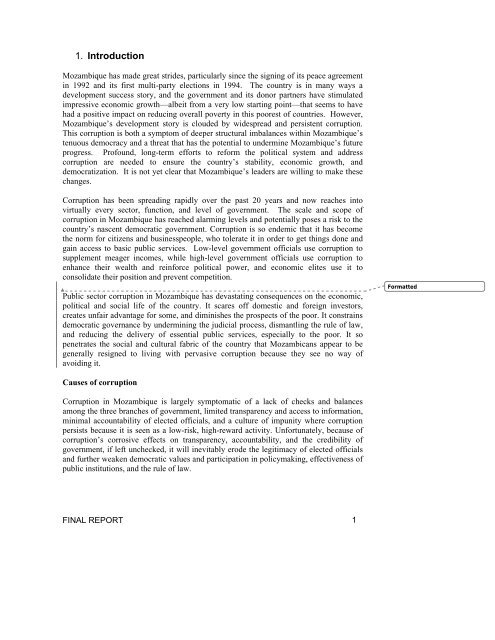
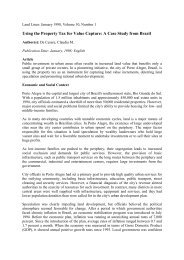

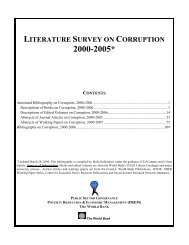
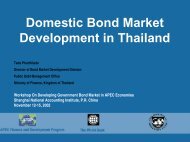
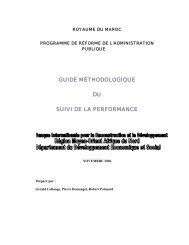
![Budget Execution: Overview [PDF 453K]; Bill Dorotinsky - World Bank](https://img.yumpu.com/47844909/1/190x143/budget-execution-overview-pdf-453k-bill-dorotinsky-world-bank.jpg?quality=85)
